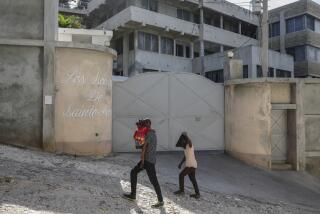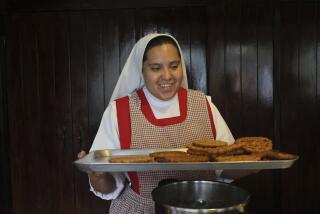Year of Living Quietly : Religion: Two women in search of spiritual fulfillment dwell among the Sisters of the Holy Cross. They take no vows and earn a small stipend.
- Share via
First thing every morning Maggie Cessar and Amanda Zenk gather at 6:15 for prayers with the eight other women who share a house in Mission Hills.
Cessar, 28, appears in a rumpled red T-shirt and aging blue sweat pants with Duquesne University stenciled on the side. Zenk, 22, is wearing sweats, a Windbreaker and a Walkman is in a bag attached to her waist. Headphones lay around her neck. She’s ready to go jogging.
Although this is one of the largest residences in Mission Hills, it takes them only a few seconds to walk down the blue-carpeted corridor into the 20-foot-square room where the candles are burning.
The door is open and the other women in the house are waiting, seated in simple wooden chairs that form a half-circle. After a quiet moment, one of the women says, “We’ll be reading from pages 103 and 204.”
This is the way morning prayers begin at the Sisters of the Holy Cross Convent.
But Cessar or Zenk are not members of the Catholic order of nuns and have no intention of joining permanently. They are, for a year, associates of the Sisters of the Holy Cross. They are part of a 20-year-old program that allows them to live with the nuns and participate in their work. They get no salary, just room and board plus a stipend of $75 a month.
The associates programs are part of a nationwide trend toward more lay volunteer work in the Catholic community, according to Father Gregory Coiro, a spokesman for the Los Angeles Archdiocese. “What you’re seeing are many who are looking for a way to put their faith into action,” he says. “People have discovered there’s a great deal of truth in the scripture of St. Paul that says it’s more blessed to give than to receive. The more you give, the more you receive back and you can never really out-give God.”
Each of the two associates in Mission Hills has her own room in the 11-bedroom convent, which sits on a gently sloping hill behind Holy Cross Medical Center where they both work. Cessar is in the marketing department, where her duties include editing the hospital quarterly Health Scene newsletter. Zenk works in the Parish Nurse Partnership, a holistic health-care program that helps parishioners learn the ties between spirituality and physical health. She is also involved with Loaves and Fishes, a Van Nuys charity that distributes food and clothing to the needy.
They don’t wear the traditional nuns’ habit because none of the sisters wear them anymore. And although the nuns take vows of poverty, chastity and obedience, the associates are asked merely to live a simple lifestyle. “On $75 a month, we haven’t been exactly living it up,” Zenk says.
“We stress that we’re not trying to get them to join us,” says Sister Mary Ellen O’Brien, who had led the 15-minute prayer session. “I think there was real hunger in both of them for something spiritual. A real hunger for something more. But not for something permanent.”
Both of the women came to the program for entirely personal reasons. Cessar, who had a career in public relations in Pittsburgh, said she learned about the associates program through a booklet called “Connections,” which lists volunteer opportunities throughout the United States. She said she was looking for a break in her high-pressured life and had even considered taking six months off to go skiing in Colorado.
“In an agency, you bill hours,” she says. “The whole concept just got so ridiculous to me--that for the rest of my life I would be billing my days away. If I’d gone off skiing, I didn’t think that would get me to where I want to be. It would be fun, but it wouldn’t be nourishing or fulfilling.”
Zenk, who grew up in the farming community of Butler, Ind. (population 2,000), was valedictorian of her graduating class at St. Mary’s College in South Bend. She did volunteer work with Mexican migrant workers in Indiana and was searching for other ways to help the Latino poor. She heard about the associates program in college, which is run by the Sisters of the Holy Cross.
“I just wanted to be completely immersed in volunteer work for a year,” she says. “I knew I wanted to do something and this was the time--when I’m not tied down.”
The fact that the program was with nuns was of secondary importance. “I didn’t choose this to live in a convent,” she says. “What I wanted was to work with the poor. This was an ideal situation.”
The Sisters of the Holy Cross, like other religious orders nationwide, have a declining membership. One nun, Sister Beverly Ann Nelson said that when she “took the bands” there were 82 novices in 1958. This year there might be one or two, she said. Nationwide, the order, based in South Bend, Ind., has 800 members worldwide. Holy Cross Medical Center, a Mission Hills institution with 316 beds and 800 employees, was founded by the religious order in 1961. In the adjoining convent there are only eight nuns.
“I wish we had more members to continue,” says Sister Mary Ellen, who is vice president of mission services at the medical center. “But in a way, I think it’s a compliment to us. I was a teacher for a long time and we really taught those kids that they were the church, that they were the people of God. So now the laity has become very active. I think we’ve done a good job there.
“We may have done our work,” she added. “When we were founded in 1841 our work was in domestic work and education. We educated the immigrants. That was the greatest need at the time. And we did that. The need is there today, but it’s being handled in a different way.”
Although none of the nuns believe the idea of having young women join the convent for short periods is the way of the future, all of them feel it’s an opportunity for both groups to share with each other. There’s a sense that the nuns--most of whom are in at least their mid-60s--enjoy having young women in the house. “They look at things differently,” Sister Mary Ellen says. “Once during prayers, Maggie played Bette Midler’s ‘From a Distance’ and talked about what it meant. It had a beautiful message. They saw how it could be integrated into prayer.”
Both of the associates said they found it relatively easy integrating into the nuns’ lifestyle. What surprised them was how much routine there was in the nuns’ lives.
“We know that at 6:15 every morning there will be prayer,” Cessar says. “Every evening at 5:45 there will be prayer, every evening at 6 there will be dinner and you’ll stay until 7. Every Monday you have a chapter meeting, which means the house gets together to discuss things or to reflect on something.”
During the weekdays, they work. After dinner, there is usually time for some TV or reading. They generally are in bed by 10 p.m. Cessar said occasionally she would exercise or go to the movies, but, “One thing we don’t do is go shopping.”
As their year comes to a close, the two women have different reflections of what they’ll take from the experience.
For Zenk, it made her a more religious person. “When I came here, I wouldn’t say I was a real strong Catholic or anything,” she says. “I really didn’t get to Mass that much. Not that I go every week now. I believe a lot more strongly in prayer. A lot.”
In the fall, Zenk will begin work on a master’s degree in Latin American literature at the University of Texas, Austin.
Cessar, who plans to stay as an employee of the marketing department of medical center after her year as an associate is up, said she feels an inner peace and a self-assuredness that she credits to a strengthened religious faith. She also takes away what she’s learned from the nuns’ mission of healing.
“One thing they’ve taught me is that healing is not all about healing the sick,” she says. “It’s about healing every person you come in contact with. Every life you touch. Even with a vendor on the phone. You can interact in a way that makes them feel better about themselves. The idea is to touch every life with a little bit of goodness. And you don’t find that a lot in the world.”


